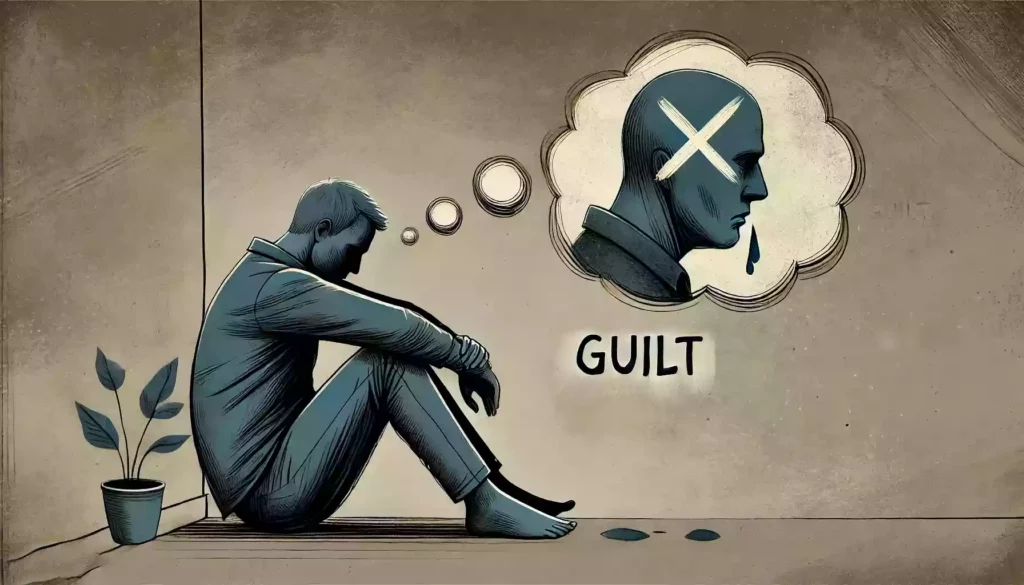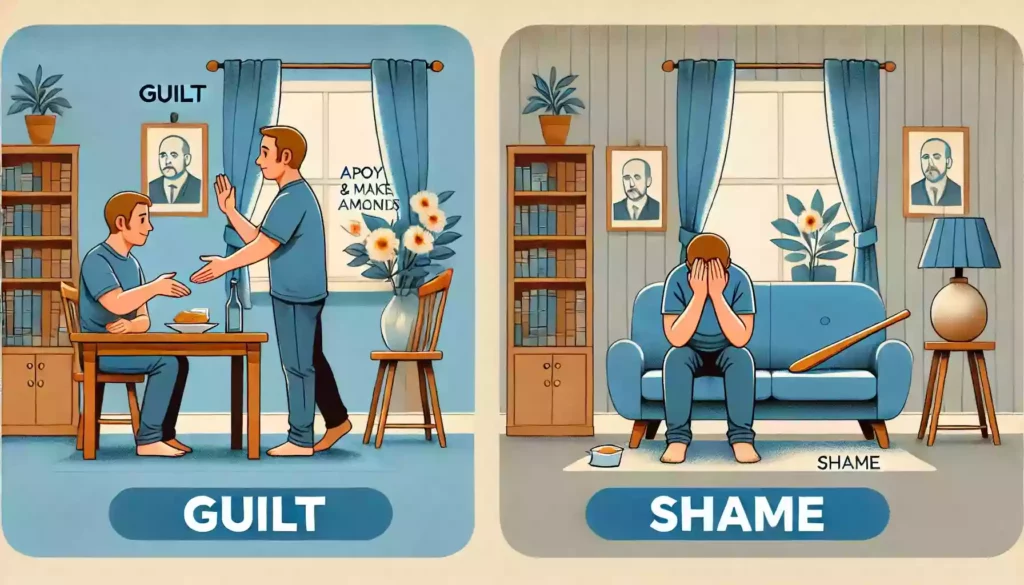Key Takeaways:
- Difference between guilt and shame
- Impact on mental health
- Practical coping strategies
- Role of self-compassion
- Expert insights and advice
Understanding Guilt vs Shame
Guilt and shame are powerful emotions that can significantly impact our mental well-being. While often used interchangeably, they have distinct differences that can influence how we perceive ourselves and our actions. Understanding these differences is crucial in managing these emotions effectively.
Guilt typically arises from specific actions or behaviors that go against our moral or ethical standards. It's a feeling of remorse or regret for something we have done. On the other hand, shame is more pervasive and affects our self-identity. It's the feeling that we are inherently flawed or unworthy.
In this article, we will delve into the core differences between guilt and shame, explore their psychological impacts, and offer practical tips to help you navigate these emotions.
The Core Difference Between Guilt and Shame
At the heart of the guilt vs shame debate lies a fundamental distinction in how these emotions relate to our sense of self. Guilt is tied to our actions, whereas shame is tied to our identity. Renowned psychologist Brené Brown explains it succinctly: "Guilt says, 'I did something bad.' Shame says, 'I am bad.'"
This difference is crucial because it shapes how we respond to these emotions. When we feel guilty, we are more likely to take corrective actions to amend our behavior. However, when we feel ashamed, we may withdraw, hide, or even engage in self-destructive behaviors because we perceive ourselves as fundamentally flawed.
Understanding this distinction can empower us to address these emotions more effectively, leading to healthier relationships and improved mental health.
Psychological Impacts of Guilt

Guilt, when experienced in moderation, can be a catalyst for positive change. It can motivate us to apologize, make amends, and avoid repeating mistakes. However, excessive or unresolved guilt can lead to a host of psychological issues. Prolonged guilt can cause anxiety, depression, and even physical health problems such as insomnia and headaches.
People often feel guilty about actions that conflict with their moral values or societal expectations. This feeling can be constructive, pushing individuals to reflect on their behavior and seek ways to improve. Yet, when guilt becomes chronic, it can turn into a destructive force, leading to self-criticism and low self-esteem.
Research has shown that unresolved guilt can significantly impact mental health. In extreme cases, it can contribute to obsessive-compulsive disorder (OCD) and other anxiety disorders. Recognizing and addressing guilt early on is essential for maintaining mental well-being.
For further insights into the effects of guilt on mental health, you can read more in this comprehensive article by Verywell Mind.
Psychological Impacts of Shame
Shame, unlike guilt, affects our core identity and can be profoundly damaging if left unaddressed. It is often described as a deep-seated feeling of inadequacy and worthlessness. While guilt is linked to specific behaviors, shame engulfs the entire self, leading to a pervasive sense of being flawed.
The psychological impacts of shame are extensive. It can lead to chronic feelings of inferiority, social withdrawal, and a lack of self-worth. People who experience shame may develop patterns of avoidance, seeking to hide their perceived flaws from others. This can result in a cycle of isolation and further emotional distress.
Shame is also closely associated with various mental health issues, including depression, anxiety, and eating disorders. It can erode self-esteem and create a negative feedback loop where individuals feel unworthy of love and acceptance, further entrenching their feelings of shame.
Addressing shame requires a compassionate approach. Therapeutic interventions, such as cognitive-behavioral therapy (CBT) and self-compassion practices, can be effective in breaking the cycle of shame and fostering a healthier self-image.
Guilt vs Shame in Everyday Life

Understanding how guilt and shame manifest in daily life can help us better navigate these emotions. Guilt often arises from actions that violate our personal values or social norms. For instance, if you forget a friend's birthday, you might feel guilty and strive to make it up to them by apologizing and planning a special outing.
In contrast, shame is more insidious and can pervade our sense of self-worth. Imagine making a mistake at work and feeling not just guilty about the error, but also ashamed, believing you are incompetent or unworthy of your position. This belief can lead to avoidance behaviors, such as not speaking up in meetings or avoiding social interactions.
The distinction is crucial because guilt can motivate positive change and reparative actions, whereas shame often leads to withdrawal and self-criticism. By recognizing these patterns, we can work towards healthier responses to our mistakes and perceived flaws.
The Role of Self-Compassion
Self-compassion plays a pivotal role in managing both guilt and shame. According to Dr. Kristin Neff, a leading researcher in the field, self-compassion involves treating ourselves with the same kindness and understanding as we would a close friend facing a similar situation. This approach can mitigate the negative impacts of guilt and shame.
When we experience guilt, self-compassion allows us to acknowledge our mistakes without harsh self-judgment. Instead of spiraling into self-criticism, we can focus on making amends and learning from our actions. This perspective helps transform guilt into a constructive force for personal growth.
Similarly, self-compassion is crucial in addressing shame. By recognizing our shared humanity and understanding that everyone makes mistakes, we can counteract the feelings of isolation and unworthiness that shame often brings. Practicing self-kindness can help us rebuild our self-esteem and foster a more positive self-image.
Integrating self-compassion into our lives involves mindfulness, self-kindness, and a sense of common humanity. These components enable us to face our imperfections with grace and resilience, ultimately leading to healthier emotional well-being.
Practical Steps to Manage Guilt and Shame
Managing guilt and shame effectively requires a combination of self-awareness, practical strategies, and support. Here are some actionable steps to help you cope with these challenging emotions:
- Recognize the Emotion: The first step is to identify whether you are feeling guilt or shame. Understanding the difference can help you address the emotion appropriately.
- Practice Self-Compassion: As discussed earlier, treating yourself with kindness can alleviate the harsh effects of guilt and shame. Remind yourself that everyone makes mistakes and that you are not alone.
- Seek Support: Talking to a trusted friend, family member, or therapist can provide valuable perspective and support. They can help you process your emotions and offer constructive feedback.
- Take Responsibility: If your guilt stems from a specific action, take steps to make amends. Apologize sincerely, and where possible, rectify the situation.
- Challenge Negative Thoughts: Shame often involves distorted thinking about your self-worth. Challenge these negative thoughts by focusing on your strengths and accomplishments.
- Engage in Mindfulness: Mindfulness practices, such as meditation, can help you stay grounded and reduce the intensity of guilt and shame. Mindfulness encourages a non-judgmental awareness of your thoughts and feelings.
- Set Realistic Standards: Perfectionism can fuel guilt and shame. Set realistic and achievable standards for yourself to reduce unnecessary self-criticism.
For a deeper dive into managing these emotions, consider reading this insightful article on handling guilt from Psychology Today.
Expert Quotes on Guilt and Shame
Incorporating insights from experts can provide a deeper understanding of guilt and shame. Here are a couple of noteworthy quotes:
"Guilt is about our actions and behaviors, while shame is about our core self. Understanding this distinction is crucial for emotional well-being." – Dr. Brené Brown, The Gifts of Imperfection
"Self-compassion involves recognizing our shared humanity and treating ourselves with kindness. This approach is essential for mitigating the negative impacts of guilt and shame." – Dr. Kristin Neff, Self-Compassion: The Proven Power of Being Kind to Yourself
These insights highlight the importance of self-awareness and compassion in managing guilt and shame, offering valuable perspectives for personal growth and healing.
Conclusion: Moving Forward with Understanding
Understanding the nuanced differences between guilt and shame is crucial for emotional well-being and personal growth. While guilt can serve as a motivator for positive change, shame often leads to a negative self-image and unhealthy behaviors. By recognizing these emotions and employing practical strategies to manage them, we can foster a healthier relationship with ourselves and others.
Embracing self-compassion is a key component in this journey. It allows us to address our mistakes and perceived flaws with kindness rather than self-criticism. By practicing mindfulness, seeking support, and challenging negative thoughts, we can transform guilt into a constructive force and mitigate the damaging effects of shame.
Moving forward, it's essential to remember that everyone experiences guilt and shame at times. These emotions do not define our worth or capabilities. By gaining a deeper understanding of their impact and learning effective coping mechanisms, we can navigate these complex feelings with greater resilience and confidence.
Incorporating expert insights and practical steps into our daily lives can lead to profound changes in how we perceive ourselves and our actions. With time and effort, we can move beyond guilt and shame, cultivating a more compassionate and empowered sense of self.
Recommended Resources
- The Gifts of Imperfection by Dr. Brené Brown
- Self-Compassion: The Proven Power of Being Kind to Yourself by Dr. Kristin Neff
- Healing the Shame that Binds You by John Bradshaw




Recommended Comments
There are no comments to display.
Create an account or sign in to comment
You need to be a member in order to leave a comment
Create an account
Sign up for a new account in our community. It's easy!
Register a new accountSign in
Already have an account? Sign in here.
Sign In Now